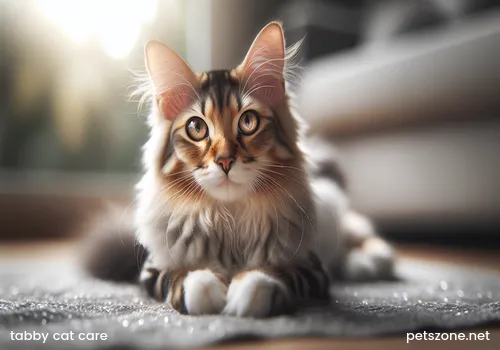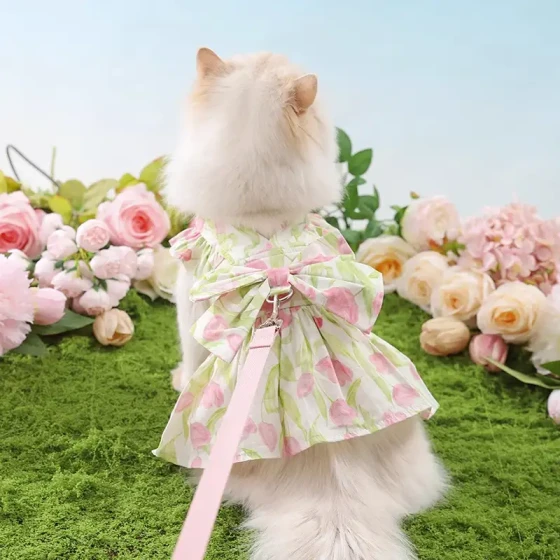Tabby Cats Must Not Be Raised_Complete Analysis of Health Hazards and Care Challenges
About the saying that "tabby cats must not be raised," it is actually an exaggerated expression. More accurately, raising tabby cats may bring unique challenges to some owners, especially in health care and daily maintenance. Although tabby cats are known for their independence, intelligence, and strong adaptability, like any pet, they have potential health problems and specific behavioral needs that future owners need to fully understand and prepare for. Knowing these potential “difficulties” can help you decide if you are fit to be a tabby cat owner and make preparations in advance.

Characteristics of Tabby Cats: What Kind of Cats Are They?
Tabby cats, as representatives of Chinese rural cats, have a long history. They are usually physically robust, with unique patterns, looking like miniature wildcats. In terms of personality, tabby cats are generally intelligent, independent, and retain strong hunting instincts. They may not be as clingy or affectionate as some specific breeds, but once trust is established, they also show loyalty and closeness. It is precisely these traits derived from natural selection that require special attention in some aspects.
Health Hazards: Not Without Worries
Although tabby cats are generally considered healthier than some purebred cats prone to genetic diseases, this does not mean they won’t get sick. Like all cats, tabby cats can face some common health problems.
- Parasite Issues: If adopting stray or free-roaming tabby cats, they may carry internal and external parasites such as fleas, ticks, and roundworms. This requires immediate deworming after adoption and regular prevention.
- Digestive System Problems: Sudden food changes, unclean food, or stress reactions can cause vomiting, diarrhea, and other digestive discomforts in tabby cats.
- Infectious Diseases: Without timely vaccination, tabby cats also face life-threatening infectious disease risks such as feline distemper, feline viral rhinotracheitis, and rabies. Regular vaccination at the veterinary clinic is essential.
- Urinary System Problems: Especially male cats are prone to urinary blockages and bladder stones, related to insufficient water intake and improper diet. Ensuring adequate hydration and high-quality cat food helps prevent these.
- Geriatric Diseases: As they age, tabby cats may develop arthritis, dental problems, kidney diseases, and other elderly illnesses, requiring more detailed care and regular check-ups.
It can be said that the “health hazards” of raising tabby cats mainly refer to providing necessary medical protection and daily health management like any pet, rather than them having a lot of congenital diseases.
Care Challenges: Where Are the Difficulties?
The saying “must not raise” largely stems from owners’ lack of understanding of the behavioral habits of tabby cats, resulting in difficulties during care.
- Energetic, needing sufficient activity space: Tabby cats retain strong hunting and exploratory instincts and need a lot of exercise to expend energy. If the living space is small and lacks toys and interaction, they may exhibit destructive behaviors like scratching furniture or overturning trash bins out of boredom. A home environment with enough vertical space (cat trees), hiding spots, and interactive time is very important for them.
- Highly independent, needing trust-building: Some tabby cats may not be as naturally affectionate as Ragdolls or Persians. They need time to adapt to new environments and build trust with their owners. This requires owners’ patience and proper interaction; forced hugs or petting may have the opposite effect. Understanding their body language and giving them the freedom to choose whether to approach or avoid is key to establishing a good relationship.
- Potential behavioral problems: Without good early socialization or if in a stressful, boring environment for long periods, tabby cats may show aggression, excessive grooming, or even depression. Owners need to consciously provide early training and guidance and pay attention to their emotional health.
- Dietary requirements: Although not as sensitive as some breeds, providing high-quality and nutritionally balanced cat food is still important. Improper diet may lead to obesity, malnutrition, or other health problems.
- Grooming care: Although their fur is relatively easy to maintain, regular brushing is still necessary, especially during shedding seasons, to help remove dead hair and reduce hairballs. Regular nail trimming, ear cleaning, and dental care are also important parts of daily care.
These “care challenges” are not unique to tabby cats, but due to some of their natural traits, they may be more prominent, requiring owners to invest more time and effort to understand and meet their needs.
Who Is Suitable to Raise Tabby Cats
Based on the above analysis, the following people may be more suitable to raise tabby cats:
- Those with cat-raising experience who understand cat habits.
- Those who can provide relatively spacious living environments with rich vertical space.
- Those with sufficient time to accompany and interact with their cats.
- Patient people willing to spend time building trust with the cat.
- Those able to afford daily expenses and medical costs for the cat.
If you are a novice cat owner or looking for a quiet and immobile “cuddle monster,” tabby cats may not be the most suitable choice for you.
How to Better Care for Tabby Cats
If you decide to welcome a tabby cat home, the following suggestions can help you care for them better:
- Provide an enriched environment: Prepare cat trees, scratching posts, various toys (wand toys, moving toys, etc.), regularly replace toys to maintain their interest in the environment.
- Early socialization: For kittens, expose them to different people and environments early to help them develop friendly personalities.
- Regular interaction and play: Spend time every day interacting and playing with your cat, simulating hunting scenarios to satisfy their predatory instincts.
- Provide balanced diet and sufficient water: Choose high-quality cat food and ensure the water fountain always has clean fresh water. Using flowing water dispensers can encourage cats to drink more.
- Regular health checks and vaccinations: Follow veterinary recommendations for vaccinations and deworming, and have a comprehensive health exam annually.
- Observe behavior changes: Closely watch changes in appetite, water intake, elimination, activity levels, and behavior to detect potential health issues early.
- Use positive training: Employ positive reinforcement such as treats and verbal praise to guide cats to develop good habits.
Frequently Asked Questions
- Are tabby cats aggressive? Tabby cats are naturally independent and may show defensive behavior if lacking socialization or feeling threatened. However, with proper guidance and trust building, they can become very friendly family pets.
- Are tabby cats low maintenance? Although their fur is relatively easy to groom, they are energetic and need considerable interaction and environmental stimulation, so they are not exactly “low maintenance” pets.
- How long do tabby cats live? With scientific feeding and good care, tabby cats typically live around 12-15 years or longer.
- Can stray tabby cats be adopted directly at home? It is not recommended to take them home directly. Stray cats may carry parasites and infectious diseases. It is advisable to first take them to a veterinary clinic for full examination, deworming, vaccination, and necessary neutering surgery.
In conclusion, tabby cats are not “absolutely not to be raised,” but require prepared and responsible owners. Understanding their characteristics, anticipating potential health and care challenges, and being willing to invest time and effort to overcome them, you can truly enjoy wonderful moments with these smart, independent Chinese rural cats. Raising tabby cats is like opening a “blind box”—although there are challenges, there is much to discover in their unique charm and the surprises they bring.



